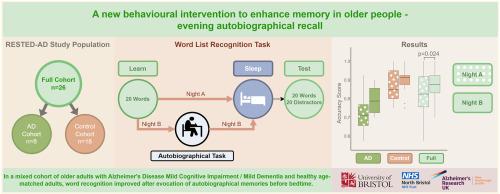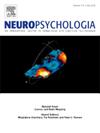A new behavioural intervention to enhance memory in older people–evening autobiographical recall
IF 2
3区 心理学
Q3 BEHAVIORAL SCIENCES
引用次数: 0
Abstract
Episodic memory deteriorates with age and in Alzheimer's Disease (AD). Interventions to enhance memory in these cohorts are limited and associated with disadvantages inherent in pharmaceuticals and in the cost/availability of formal cognitive enhancement programmes. Here we tested whether an autobiographical retrieval task could enhance performance in a separate word-list recognition task.
The RESTED-AD Study (Remote Evaluation of Sleep To enhance understanding in Early Dementia) was a cohort study comprising individuals with AD MCI/early dementia and age-matched healthy controls (HC). Participants completed a word recognition task twice, with learning and test phases separated by sleep. On one occasion, participants wrote down 5 autobiographical events occurring in their day before bedtime (Autobiographical Condition). Episodic memory accuracy was compared in the Autobiographical vs Standard Condition. Sleep was recorded utilising a home-based EEG headband.
Twenty-six participants (AD = 8, HC = 18, 5 Female) had mean (SD) age of 70.0 (6.6), and Montreal Cognitive Assessment Score of 26.1 (2.4). Full cohort accuracy score increased in the Autobiographical Condition [% Mean (SD) Standard = 82.0 (11.0), Autobiographical = 86.4 (8.1), Cohen's D = 0.452, p = 0.024]. This relationship maintained after correction for confounding variables and task order. After False Discovery correction, no evidence was found to support sleep-mediated mechanisms.
Autobiographical memory evocation was positively associated with recognition memory performance in older adults and individuals with AD. As an intervention with no foreseeable risks, replication of this finding and further work to establish underlying mechanisms is warranted.

一种增强老年人记忆的新行为干预——夜间自传体回忆。
情景记忆随着年龄的增长和阿尔茨海默病(AD)而恶化。在这些人群中,增强记忆的干预措施是有限的,并且与药物固有的缺点以及正式认知增强计划的成本/可获得性有关。在这里,我们测试了自传体检索任务是否可以提高单独的词表识别任务的表现。rest -AD研究(睡眠远程评估以提高对早期痴呆的认识)是一项队列研究,包括AD MCI/早期痴呆患者和年龄匹配的健康对照组(HC)。参与者完成了两次单词识别任务,学习和测试阶段被睡眠分开。在一个场合,参与者在睡觉前写下5个发生在他们一天中的自传体事件(自传体条件)。在自传体条件和标准条件下比较情景记忆的准确性。使用家用脑电图头带记录睡眠情况。26名参与者(AD = 8,HC = 18,女性5)的平均(SD)年龄为70.0(6.6),蒙特利尔认知评估评分为26.1(2.4)。自传体条件下全队列准确率得分升高[% Mean (SD) Standard = 82.0 (11.0),Autobiographical = 86.4 (8.1),Cohen’SD = 0.452,p = 0.024]。在对混杂变量和任务顺序进行校正后,这种关系保持不变。在错误发现纠正后,没有证据支持睡眠介导的机制。在老年人和AD患者中,自传体记忆唤起与识别记忆表现呈正相关。作为一种没有可预见风险的干预措施,有必要重复这一发现并进一步开展工作以建立潜在的机制。
本文章由计算机程序翻译,如有差异,请以英文原文为准。
求助全文
约1分钟内获得全文
求助全文
来源期刊

Neuropsychologia
医学-行为科学
CiteScore
5.10
自引率
3.80%
发文量
228
审稿时长
4 months
期刊介绍:
Neuropsychologia is an international interdisciplinary journal devoted to experimental and theoretical contributions that advance understanding of human cognition and behavior from a neuroscience perspective. The journal will consider for publication studies that link brain function with cognitive processes, including attention and awareness, action and motor control, executive functions and cognitive control, memory, language, and emotion and social cognition.
 求助内容:
求助内容: 应助结果提醒方式:
应助结果提醒方式:


